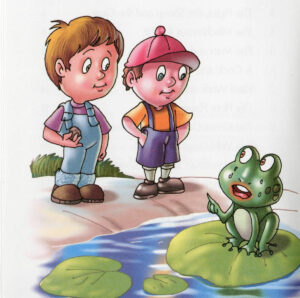German short stories – Learning German through English
Aesop’s Fables – Die Jungen und die Frösche
Once upon a time, there was a large pond in the village. A big family of frogs used to live in the pond. The frogs and the villagers were living in harmony together. The frogs kept the insects away from the pond. The villagers used to draw water from the pond. It was a very happy village.
One day, two boys came to the pond and thought, “Hey, would it not be fun if we could throw some stones into the pond?”
TranslateEs war einmal ein großer Teich im Dorf. Im Teich lebte früher eine große Familie von Fröschen. Die Frösche und die Dorfbewohner lebten in Harmonie zusammen. Die Frösche hielten die Insekten vom Teich fern. Die Dorfbewohner schöpften Wasser aus dem Teich. Es war ein sehr glückliches Dorf.
Eines Tages kamen zwei Jungen zum Teich und dachten: „Hey, würde es nicht Spaß machen, wenn wir ein paar Steine in den Teich werfen könnten?”

The boys thought that it was a good idea and started throwing stones into the water and watch the water splash. The boys were enjoying themselves very much. But while they were enjoying, the frogs were trembling in fear. Many of the stones were big enough to hurt the frogs. The frogs had to hide but even so, they were not safe.
TranslateDie Jungs hielten das für eine gute Idee und warfen Steine ins Wasser und sahen zu, wie das Wasser spritzte. Die Jungen hatten viel Spaß. Aber während sie es genossen, zitterten die Frösche vor Angst. Viele der Steine waren groß genug, um die Frösche zu verletzen. Die Frösche mussten sich verstecken, aber trotzdem waren sie nicht sicher.
Finally the oldest of the Frogs put his head out of the water and said to the boys, “My dear children. I can see that you are enjoying yourselves very much. It may be fun for you but did you think that this may mean death to us?”
TranslateSchließlich steckte der älteste der Frösche seinen Kopf aus dem Wasser und sagte zu den Jungen: „Meine lieben Kinder. Ich kann sehen, dass Sie sich sehr amüsieren. Es könnte euch Spaß machen, aber habt ihr gedacht, dass dies für uns den Tod bedeuten könnte? “
Hope you had fun learning German through short stories 🙂 If so leave a comment!!!
For more languages:
Learn German through Short stories: https://childhood-stories.com/German
Learn Spanish through Short stories: https://childhood-stories.com/Spanish
Learn Italian through Short stories: https://childhood-stories.com/Italian
Learn Dutch through Short stories: https://childhood-stories.com/Dutch
Learn French through Short stories: https://childhood-stories.com/French
Learn Portuguese through Short stories: https://childhood-stories.com/Portuguese
Learn Portuguese through Short stories: https://childhood-stories.com/English
About: Studying through Dual Language immersion is among the best techniques for learning a new language. The objective of this website is to teach yourself how to read and speak German confidently using English as a base 🙂 These German short stories are super cool to read for beginners and also for entertaining children. Aesop’s Fables are among the best stories that can be studied on a daily basis.
About the Editor
The author of this German dual language short story is a C1 Goethe certified German language expert. He has over 5 years’ experience in teaching German and over 8 years learning.
He has conducted over 1000 plus hours of classes to over 300 students. In simple words (his words as well as his student’s words), he is AWESOME!!! He can be reached out to at deindeutschlehrer24@gmail.com
He also provides German Language courses for A1, A2 and B1 levels. Below are the details for the same:
Fees for A1, A2 and B1 levels are 120€,140€ and 160€ respectively.


